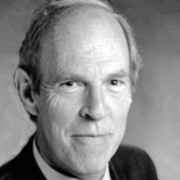
Peter Vere-Jones
The career of actor Peter Vere-Jones encompassed radio, television, theatre and film, in roughly that order. En route, he did everything from Shakespeare to splatter, and played everyone from a deserting soldier to Zeus.
Born in Cheshire in northwest England, Vere-Jones moved to New Zealand with his family as a child. He began acting in 1962, initially for state radio. State television was just a few years old. Vere-Jones would feature in a number of key dramas from that first decade of local television: early teleplay The Evening Paper (1965), the country's first drama series (The Alpha Plan, 1969), the first local TV drama filmed in colour (The Killing of Kane, 1971) and acclaimed small town show Pukemanu (1971-72).
Vere-Jones was on hand as the new medium of television made its first tentative steps. The Evening Paper was recorded in live fashion, where one big mistake meant going back and filming a half-hour all over again. In the second clip of this documentary about the play's writer Bruce Mason, Vere-Jones recalled having to repeat an entire scene after midnight, after a vision mixer made an error at the end of a scene.
The teleplay saw him co-starring as a young Englishman, who, in a memorable speech, launches a spirited attack on middle class New Zealand. Vere-Jones recalled that Mason received "vitriolic" reactions afterwards. "The audience couldn't take it".
After larking around New Zealand for The Taking Mood and joining conspiracy thriller The Alpha Plan, Vere-Jones co-starred in The Killing of Kane. Set in 1860s Aotearoa, the one-off drama was well ahead of its time in its nuanced treatment of Māori-Pākehā history. As academic Annabel Cooper has argued, the result "levelled barbs at a nation overly contented with its colonial past". Vere-Jones was excited to play real life figure Kimble Bent, a soldier in the British Army who deserted and joined warrior Tītokowaru. Although it was the first Kiwi TV drama filmed in colour, The Killing of Kane first screened in black and white.
A decade later, Vere-Jones won his only co-starring role in a feature film, playing another real life figure from the past. In Pictures he was 19th century photographer Walter Burton, whose images of Māori imprisoned by colonial troops are frowned upon by the authorities. Walter's brother Alfred (Kevin J Wilson) is more prepared to tow the line. Shooting on location in winter proved challenging for both cast and crew. Pictures won a number of good reviews, especially overseas. Others accused it of distorting history and giving the Burton brothers a sensitivity they did not really have (Walter's photographs of Māori prisoners were invented).
After Pictures there were two more co-starring roles, this time on the small screen. In teleplay The Good Samaritan, his character answers a late night call from a woman (Heather Lindsay) having a midlife crisis. In Casualties of Peace he was a war veteran on a collision course with his pacifist son (Michael Hurst). Vere-Jones also had a forgotten role that another actor made famous. In Glide Time, the first TV adaptation of Roger Hall's smash play of the same name, he played Welsh-born public servant Hugh. When Gliding On launched in 1981, the role was back in the hands of Welshman Ray Henwood, who'd first played Hugh onstage.
That same decade, Vere-Jones worked for the first time with director Peter Jackson. He provided the voice of vomit-spewing villain Lord Crumb in Jackson's first movie Bad Taste (1988), then voiced hippo boss Bletch — another memorable baddie — in follow-up Meet the Feebles (Vere-Jones also voiced the film's Cockney stage manager Arthur the worm). Later the actor cameoed in Braindead.
There were many more roles along the way, more often small than large — although some parts were both at the same time (e.g. Zeus on Hercules). In kidult hit Children of Fire Mountain, he ran the local hotel. He commanded boats of various sizes in Savage Islands and The Adventures of Swiss Family Robinson, and was a murder suspect in this Duggan telemovie. In What Really Happened - Votes for Women, he played suffrage-friendly politician John Hall. His distinctively modulated tones could also be heard narrating documentaries, from making of docos, to deer tale The Aphrodisiac Trail.
Onstage in Wellington, where he had dozens of roles over 40+ years, there were starring roles in Amadeus, Waiting for Godot, "unqualified triumph" No Man's Land (one of many Harold Pinter plays on his CV), and Roger Hall's State of the Play. Beginning in 2000, he was the first actor since Bruce Mason himself to be permitted to tour Mason's solo play The End of the Golden Weather.
In the late 1980s Vere-Jones found himself centre stage in a very different kind of drama. Documentary Crisis: One Man's Fight chronicles his treatment, after learning he had bowel cancer.
In 2002 Vere-Jones was named an Officer of the New Zealand Order of Merit for his contributions to acting and writing (which including many theatre reviews).
Peter Vere-Jones died overnight on 26 January 2021, not long after appearing in an advertisement for the Interislander. He was 81 — not 82, as some media reported.
Profile published on 27 January 2021
Sources include
'Peter Vere-Jones' Auckland Actors website. Accessed 27 January 2021
Annabel Cooper, Filming the Colonial Past - The New Zealand Wars on Screen (Dunedin: Otago University Press, 2018)
Trisha Dunleavy, Ourselves in Primetime - A History of New Zealand Television Drama (Auckland University Press, 2005)
John Reid, Whatever It Takes - Pacific Films and John O’Shea 1948 - 2000 (Wellington: Victoria University Press, 2018)
John Smythe, Downstage Upfront - The First 40 Years of New Zealand’s Longest-running Professional Theatre (Wellington: Victoria University Press, 2004)
Kaleidoscope - Bruce Mason 1921 - 1982 (Television Documentary) Director John Anderson (TV One, 1983)
Unknown writer, 'The End of the Golden Weather' (Theatre programme) Te Papa, 2000
Circa 1976 - 1996 Editors John Reid and Ruth Jeffrey (Wellington: GP Print, 1996)